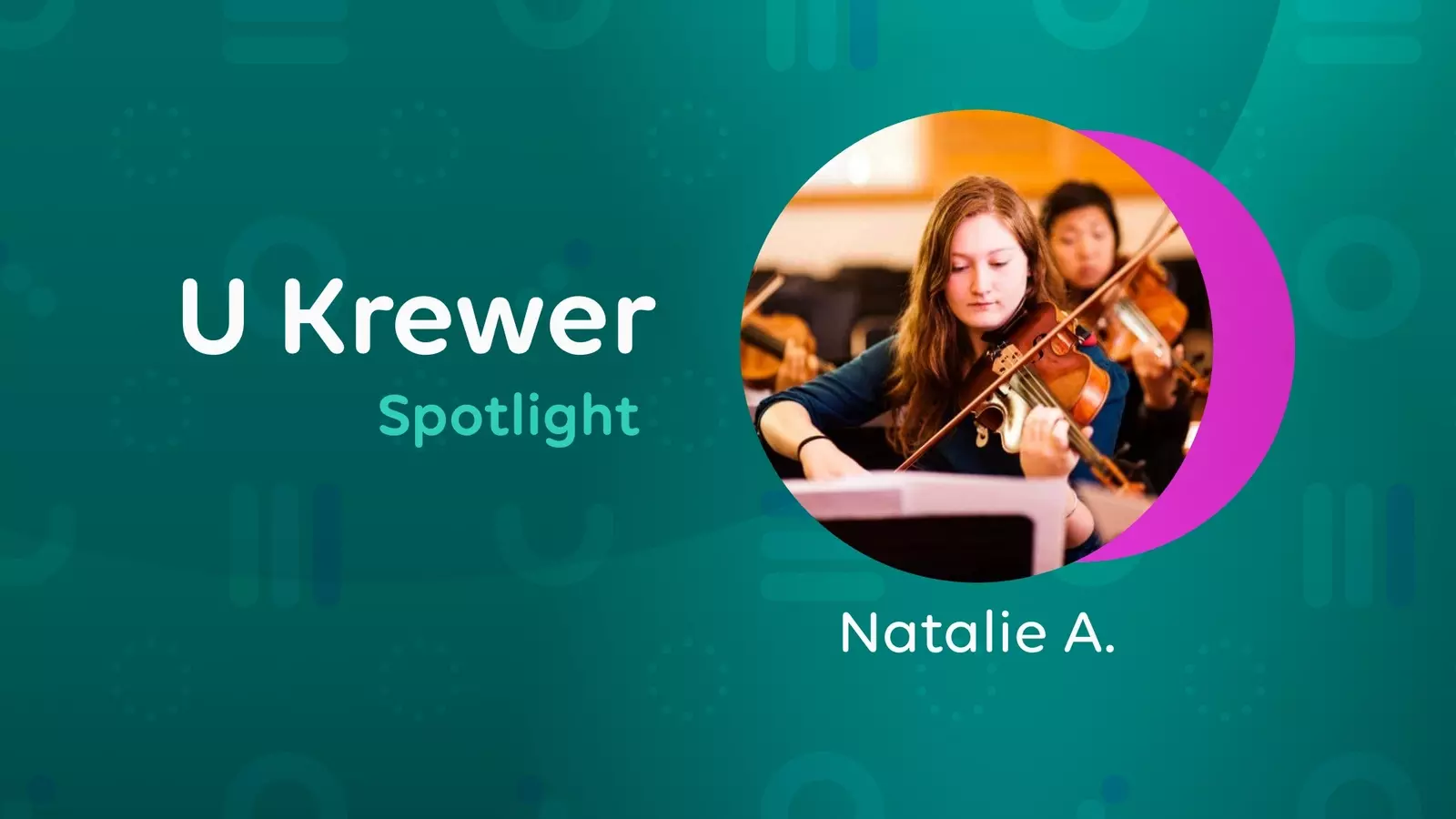U Krewer Natalie A. is a fierce advocate for individuals on the spectrum and those who don’t fall into society’s norms of “likeness” versus “unlikeness.” Her own diagnosis came during her college years, and while it didn’t change her experiences, it provided her with the tools to understand and accept the challenges.
In honor of National Disability Employment Awareness Month (NDEAM), UKG chatted with Natalie, who is a founding member of UKG’s disability employee resource group, ADAPT (Accessibility & Disability Allies Partner Together), to better understand her experiences and how we can support peers, colleagues, and candidates who don’t fit our expectations.
How does being neurodiverse influence the way you experience and interact with others? On several levels, I see the world in a fundamentally different way than a neurotypical person might, and all these levels interact to influence my behavior and my perspectives on the world. I am neurologically hypersensitive to certain stimuli—especially touch and sound—in a way that influences my physical responses. A single hair on my skin itches fiercely, and multiple voices talking at once form a brutal wall of sound—which influences my behavior. I don’t wear wool sweaters without an underlayer, and I often wear earbuds without playing anything through them. My brother knew he was getting mittens for Christmas because I asked him to pick the yarn that felt best, and I prefer quiet nights in compared to lively nights out. To a certain extent, this is how every individual’s brain shapes their reality. The difference is that mine falls outside the range of expected variation you’d see in neurotypical people. Falling outside this range has had a demonstrable impact on my life.
Share one misconception about neurodiversity. Let’s start with the term “neurodiversity” itself, which breaks down into “neuro-” for brain and “diversit-” for variation. In recent years, it has become a welcome rallying cry in politics and business for the inclusion of a community that routinely gets overlooked in other diversity efforts. However, the upbeat connotation it carries tends to overlook the way “diversity” is a root word for describing difference itself; no matter how hard we try to change them, we still live in societies that value “likeness” over “unlikeness.” Confronting difference, no matter what kind, is an uncomfortable experience because of the shock we feel when our expectations are subverted. To me, embracing neurodiversity is evolving from saying that your workplace, school, or restaurant welcomes neurodivergent people, to actually treating an employee with strong motor tics or a deeply anxious student or a customer with an intellectual disability with the same dignity and patience you would afford to anyone else in their position. This does not mean you treat them all the same way but encourages you to go into every interaction expecting the unexpected (a valuable mindset for any interaction in 2022).

You were diagnosed with autism while studying at the New England Conservatory of Music in Boston. How did the diagnosis affect you? In the first semester of my first year at the New England Conservatory (NEC), I started therapy because I thought I was addicted to the internet. By the end of that year, my therapist—having listened to months of me talk about how “the entire world feels itchy” and how much effort it took for me to start and maintain social relationships—cautiously suggested the possibility that I might be on the autism spectrum. Even after almost a decade, it’s hard to describe how good it felt to have a lifetime of disjointed experiences click into place all at once, and the profound clarity and relief that followed in its wake. For a long time, a self-diagnosis was all I needed; in my third year, however, fatigue from pushing myself to study and practice and live like my neurotypical peers began to drag down my grades and my spirits. At the same time, I realized that, while I had learned so much from my experiences, my love for chamber music alone was not going to help me overcome the challenges I faced in interpreting the subtle social dynamics of balancing individual priorities and group needs within a string quartet. Maybe it was time to listen to my instinct to dive into a new field, and to play to my personal strengths in a different context.
Share a few challenges you’ve experienced in the workplace. The challenges I experience at work are best explained through the metaphor of a glass maze: The explicit responsibilities of a job (the paths you can see on the ground) are often complicated or blocked entirely by implicit expectations and social dynamics (the glass maze’s walls). When I started a new job, I learned quickly, took on whatever my managers asked of me, and carefully crafted a mask of neurotypical behavior to fit my workplace. However, the longer I pushed myself to become whoever my role needed me to be, the harder it was to hold that mask up to my face. As I grew more and more fatigued from performing to neurotypical expectations, I ended up violating those expectations more and more often, colliding sharply with the walls of the glass maze. After a while, I would resign myself to wandering the same two or three paths of the glass maze at work, where I knew I wouldn’t make waves or upset someone by accident. Expending this much energy at work left me with almost nothing left for creative thought, innovation, or even the most basic self-care.
However, when I started an internship at UKG, I decided to disclose my disability status up front, something I hadn’t done in prior roles. My managers immediately rose to the challenge, consulting with me about possible accommodations before I started, and sincerely listened to my requests for detailed instructions and regular check-ins on longer projects. I’m still in awe at how little they hesitated in making me feel welcome and productive, and I’m proud to work at a company that makes an inclusive culture shift look so easy.
The challenges I experience at work are best explained through the metaphor of a glass maze: The explicit responsibilities of a job (the paths you can see on the ground) are often complicated or blocked entirely by implicit expectations and social dynamics (the glass maze’s walls).
Who do you turn to for support? My family has been, and still is, my greatest source of strength and guidance for getting through the world. People who have met my mother first still tell me they think I sound like her on calls, but they often don’t realize that when I respond that “she taught me to talk,” I mean that very literally. Her enthusiasm for humanity and her expertise in the subtleties of social interaction have given me a nuanced toolkit of communication skills for any situation. My father’s impact may seem quieter in contrast, but I would not have made it through those moments of self-loathing and discouragement without his steady reassurance and hard-won survival lessons. As for my brother? His drive, self-discipline, and kindness are an endless source of inspiration, and I know no one else who navigates the wilderness of LinkedIn with as much confidence.

You are a founding member of UKG’s disability employee resource group, ADAPT. Is there an accomplishment you are most proud of? Working to shape ADAPT into the community it is today has been an incredible honor, and I’ve relished the opportunity to grow as a facilitator and interviewer during my tenure as host of the visual podcast series “How we ADAPT” (currently on hiatus). What makes me feel most accomplished, though, is when I get messages from colleagues about my advocacy work. Hearing people share their experiences as parents or caretakers of individuals on the spectrum—including themselves—is a privilege that I don’t take lightly, considering that the stigma against discussing mental illness and cognitive disability at work is still strong in the countries where we work. More than anything, these conversations remind me that being open about my autism at work can make a genuine difference in how my autistic peers are treated.
In honor of NDEAM, what advice would you like to share with your fellow U Krewers and workplaces in general about neurodiversity, accessibility, and disability? First, there is a difference between an employee who isn’t “the right fit” and one who doesn’t fit your expectations. Be careful not to disqualify someone from a role because they’re not what you expected them to be. This holds just as true for “obvious” expressions of neurodivergence like repetitive behaviors or speech patterns, as it does for “subtle” ones like intermittent eye contact or struggles with organizing complex tasks. If a human brain falls outside of the neurotypical range, it is not inherently incapable. Instead, it might take some time to craft another path to developing that brain’s potential.
Which leads me to number two: Consider updating your personal or organizational definition of “success.” When the American poet Robert Frost walked the road less taken, it was only in hindsight that he’d said that road “made all the difference,” and he spent a long time staring into the woods down both paths to decide which one to take. Limiting yourself, or anyone you work with, to only a few avenues for “success” or “accomplishment” is not going to help an individual grow, and it won’t help your organization grow either. As any accessibility professional will tell you, accommodations at work are like curb cuts on sidewalks: They might have been designed with wheelchair users in mind, but anyone with a stroller or a cart full of boxes is thankful for them too.
Interested in joining the U Krew? Explore careers at UKG.
Learn more about UKG’s employee resource groups (ERGs).
Find out how UKG is building an inclusive environment for all people.
Check out this guide for ideas on how to create a more diverse, inclusive, and equitable organization at work.



